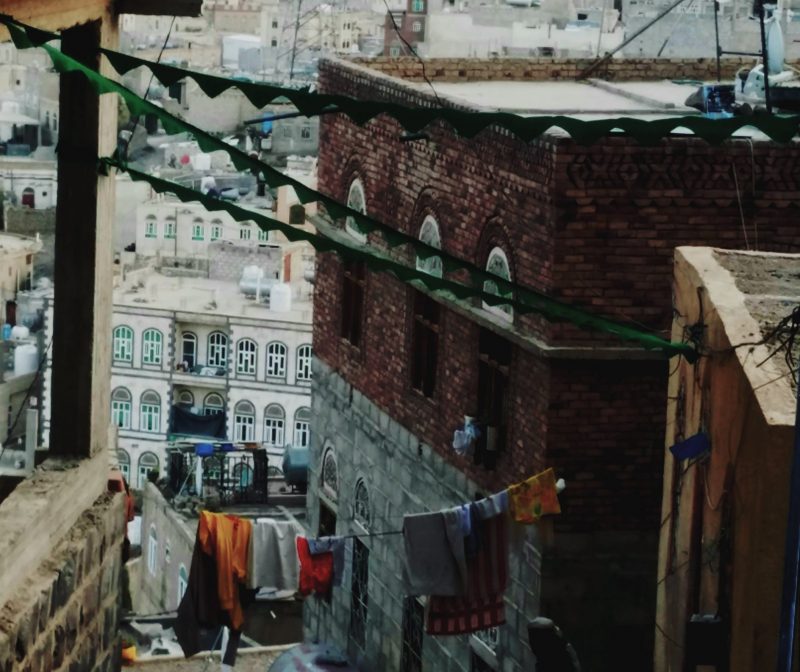Since 2015, the world has watched in collective stunned silence the devastation of the nation of Yemen. Torn apart by an Iranian-Saudi proxy war and the residual effects of disease, hunger, and displacement, the nation has been regarded as the world’s most significant humanitarian crisis for several years.[i] The suffering of the children of Yemen is particularly heartbreaking, as the country is losing an entire generation of young people to suffering that was completely out of their hands and with which they have no responsibility for causing. The foundation of a strong and progressive society is education, and the children of Yemen have been denied the opportunity to learn, and thus to problem solve, and eventually to lead. The war being fought in Yemen is more than a contemporary quagmire; it is a catastrophe whose ramifications will be felt for decades.
The global pandemic, now entering its second year of impact, has affected Yemen greatly. The lack of infrastructure has allowed the virus to spread rampantly, and children are again the most vulnerable. While COVID-19 has thus far proven to be less virulent amongst children when compared to adults, the impact of the virus upon Yemen leaves children susceptible to illnesses that were previously preventable. In June of 2020, UNICEF feared that nearly two and half million Yemeni children would face malnutrition as the country’s infrastructure collapses under the stress of war and the pandemic.[ii] With an estimated nine and half million children lacking access to clean water and sanitation, life for Yemen’s youngest citizens is increasingly harrowing. During the spring and summer of 2020, fear of coronavirus led to a eighty percent drop in visits to health facilities for Yemeni families, and those who do venture to a functional hospital find themselves unable to pay for the basic services their children require.[iii] Yemen faces the harrowing combination of a war-torn nation, extreme poverty and starvation, and a global pandemic, but sadly, many of these conditions in Yemen were dire even before the outbreak of COVID-19, with cholerae cases found in 311 out of a potential 333 school districts, according to Reliefweb.[iv] These numbers are terrifying, but the onset of a virus that spreads with chilling rapidity only exacerbates the suffering of those least positioned to fight for themselves. When ill or hungry, one cannot commit oneself to education, and with only thirty-five percent of schools providing meals, children face hunger that is far more demanding of any tasks asked of them in school.[v] By 2019, the number of children found to be in need of academic assistance was nearly five million; this number is not just shocking in the immediate but begs the question about who will grow up to rebuild and lead Yemen.
While students are undoubtedly suffering, those who attempt to teach them are victimized as well. With teachers not being paid for months or even over a year, the profession is quickly eradicating, and already unsupplied schools are now often without teachers to occupy battered rooms. According to a report from Al Jazeera, in the city of Taiz, nearly fifty schools have been damaged to the point of closing, leaving thousands of children without educational opportunities. In all, estimates are as high as nearly eight million children currently not attending school in a country in which over 2,500 schools have been damaged or destroyed, and three million people have been displaced from their homes.[vi],[vii] The ramifications of these numbers are innumerable at this point but will certainly haunt Yemen in upcoming decades. The lost children of Yemen are often conscripted in reel fighting forces, found begging on the streets, or dying of disease. The immediate condition of Yemen, a country decimated by fighting between Saudi-supported government forces and Iranian-backed Houthi rebels (a mainly Zaidi Shia movement formed by a member of the Houthi tribe), is so dire that one may not be cognizant of what the long-term future will hold. However, unless the world acts immediately to bring about a peaceful resolution to the fighting, the physical reconstruction of this beautiful country will pale in contrast to the emotional, social, and educational rebuilding that will be required.
The lack of international involvement or concern for Yemen is devastating, and there is no easy answer as to why this heart-wrenching fighting has been allowed to continue for over six years. However, the past mistakes should be tabled, however briefly, in exchange for concentration upon the improvement of the immediate situation. With recent peace offerings proposed by Saudi Arabia, there may be glimmers of hope within this nightmarish clash of regional powers seeking greater hegemony. Tragically, the long-term suffering of Yemen’s children will not be worth any territorial or political gains made through years of shelling and forced displacement. The children who are currently without a school or without a sense of stability and safety will grow up to not only be poorly educated, but also in a state of perpetual fear, surrounded by the scars of war. Human Rights Watch has reported crimes against civilians, including children, and the effects of the war include stunted growth and crippling malnutrition.[viii] Rebuilding the lives of the children of Yemen will require more than walls with blackboards and students taking notes, but that is an essential start to the reestablishment of Yemen’s future. This future, sadly, rests in the hands of the parties who started and who perpetuate the war, not the children trapped in the metaphorical and literal crossfire.
The images of sick and dying children should be enough to galvanize a louder and more pronounced global response. COVID-19 has added yet another wave of challenges for those who are the most vulnerable, as well as making the distribution of humanitarian aid problematic. However, the continued international silence represents an inexcusable sense of ennui, and this lack of action must be actively condemned if Yemeni children are ever going to be able to find their ways back to school and start the forging of a brighter future. Yemen runs the risk of becoming a wasteland within the Middle East whose recovery, if ever, could be generations away. It is imperative that global leaders prudently use sanctions and public pressure to bring a ceasefire to this clash to not preserve the present but to also offer hope for a future.
[i]‘Yemen Remains ‘Worst Humanitarian Crisis’’: UN Office,’ Anadolu Agency, January 2021, https://www.aa.com.tr/en/middle-east/yemen-remains-worst-humanitarian-crisis-un-office/2106553, accessed 2nd April 2021.
[ii] ‘Yemeni Children Face Deadly Hunger and Aid Shortages as Covid-19 Pandemic Spreads,’ UNICEF, June 2020, https://www.unicef.org/press-releases/yemeni-children-face-deadly-hunger-and-aid-shortages-covid-19-pandemic-spreads, accessed 5th April 2021.
[iii] ‘Children ‘Pay the Highest Price’ in Yemen War, says Save the Children as Seven Injured While Leaving School,’ Save the Children, 7th March 2021, https://www.savethechildren.net/news/children-%E2%80%98pay-highest-price%E2%80%99-yemen-war-says-save-children-seven-injured-while-leaving-school, accessed 6th April 2021
[iv] ‘Yemen Education Crisis: 2020 Secondary Data Review Report,’ https://reliefweb.int/report/yemen/yemen-education-crisis-2020-secondary-data-review-sdr-report, 22nd January 2021, accessed 2nd April 2021.
[v] S. Faruqui, ‘You’ve Rebuilt the Othman ben Affan School!’ 2nd February 2021, https://muslimhands.org.uk/latest/2021/02/educating-children-from-destroyed-schools-in-yemen, accessed 4th April 2021.
[vi] ‘World Report 2021,’ Human Rights Watch, January 2021, https://www.hrw.org/world-report/2021, accessed 2nd April 2021.
[vii] ‘In War-torn Yemen, a Bombed School Brings Back Hope to Children,’ Al Jazeera News, 9th October 2020, https://www.aljazeera.com/features/2020/10/9/in-yemen-children-begin-classes-in-the-ruins-of-war, accessed 5th April 2021.
[viii] ‘World Report 2021,’ Human Rights Watch, January 2021, https://www.hrw.org/world-report/2021, accessed 2nd April 2021.

